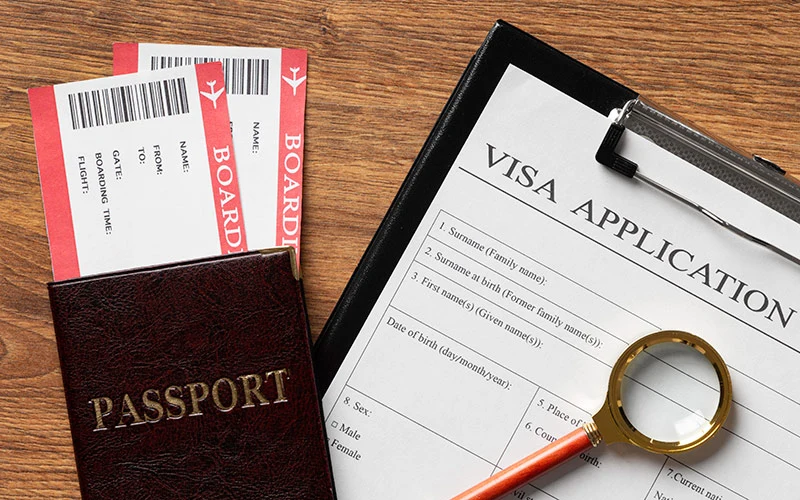Learning how to obtain a Self-Sponsorship Visa UK can be a smart move if you want to launch or join a new business. If they have a sponsor license for skilled workers, it allows business owners to operate in the UK. But before you apply, what should you know about this visa? Read on to know more.
What is the Self-Sponsorship Visa for the UK?

People working together in a professional setting. People working together in a professional setting. Let us start by defining the UK self-sponsorship visa and identifying its beneficiaries. People who want to start or grow a business in the UK or operate independently without the help of outside sponsors will find this immigration option especially tempting because it gives them the freedom to handle their immigration procedure on their own.
Eligibility Criteria for a Self-Sponsorship Visa
Before applying, you must be aware of the self-sponsorship visa UK requirements.
1) Experience or credentials pertinent to a position requiring skilled labor.
2) You must be at least eighteen years old.
3) A workable business plan is required.
4) Have enough money.
5) Achieve a CEFR English language proficiency of B1 or higher.
6) Have a spotless immigration and criminal record.
Process for Self-Sponsorship in the United Kingdom
There are multiple steps in the self-sponsored visa UK procedure.
1) Establish a Business in the UK
Creating a legitimate UK-based business is the first step in self-sponsorship. This involves registering the business with the official government company registry, Companies House. The organization must adhere to all legal requirements, including selecting an appropriate business structure such as limited company or sole trader and filing the necessary documentation. Along with making sure the business is up and running, you also need to open a UK business bank account. It sets up your financial activities in the nation. This will enable you to prove that your company is operating profitably and that it can carry out sponsorship responsibilities. Many applicants research the UK Visit Visa from Dubai in order to gain an understanding of the local market and business climate before moving on to a business-related pathway.
2) Request a Sponsor License
After your company is up and running, you must apply to the Home Office for a skilled worker sponsor license. This application proves that your business is qualified and able to sponsor employees, including you. Your organization must fulfill certain requirements in order to obtain the license, including demonstrating that it operates legally in the UK and having the right mechanisms in place to handle sponsorship duties. Your company can sponsor employees for skilled worker visas if your application is approved.
3) Obtain a Certificate of Sponsorship
The next step is to send out a Certificate of Sponsorship to yourself after acquiring a sponsor license. This is done through the Sponsor Management System provided by the Home Office. The CoS is an electronic document that specifies your employment with the UK company you founded and attests to your compliance with the conditions for the skilled worker visa. To prevent delays or rejections, you will need to submit accurate and comprehensive documentation.
4) Apply for a Visa for Skilled Workers

You can then apply for a skilled worker visa after obtaining the CoS. Several documents must be sent with this application, including proof of your credentials, your position within the organization, and proof that you satisfy the necessary skill and pay levels. As part of the visa application procedure, you will also have to fulfill health and character standards and pay the applicable costs. This entails submitting a criminal record certificate and passing a TB test. You have the legal right to reside and work in the UK under the self-sponsorship route if this visa is approved. Stay updated with the latest Skilled Worker Visa changes, as they can directly impact your self-sponsorship route and business plans.
5) Keep Compliance While Running Your Company
The last step in the UK sponsorship visa process is to continue to operate your business in accordance with UK sponsorship and immigration laws after receiving your skilled worker visa. It will be your responsibility to keep accurate records and notify the Home Office of any changes. Penalties or the loss of your sponsorship rights could follow noncompliance.
Checklist for Documents
The following required sponsorship visa UK paperwork must be submitted.
1) A plan for business
2) Certificate of company registration
3) Results of the English test, CoS, and passport
4) Statements of business accounts
5) The TB test
6) Evidence of funding
Important Considerations When Applying for the Self-Sponsorship Route
At every step of the self-sponsorship application process, attention to detail is essential. You must,
1) Meet the requirements for a sponsor license
The Home Office has severe requirements that must be met to obtain a sponsor license. To manage sponsorship duties, such as keeping correct records and keeping an eye on sponsored personnel, your organization has to have the right mechanisms in place. To guarantee continued compliance, you should also be ready for any Home Office audits.
2) Adherence to the legal requirements of the UK
Make sure your company abides by all UK rules and regulations. This includes keeping correct financial records, abiding by labor regulations, and paying taxes. The self-sponsorship procedure may become complicated if noncompliance occurs.
3) Correct and Complete Records
Your application may be delayed or compromised if you submit documents that are inaccurate or incomplete. Verify all documentation, including sponsor license application forms, company registration information, and other necessary documents, to make sure they adhere to Home Office regulations. Only when you have acquired all the necessary paperwork for the self-sponsorship process can you schedule your UK visa appointment.
4) Meet the Conditions Required for a Skilled Worker Visa
You must fulfill certain requirements in order to be eligible for a skilled worker route. This includes having a current Certificate of Sponsorship, proving that you possess the necessary degree of expertise, and meeting the pay scale for your position. To prevent delays or rejections, your application must fully satisfy these requirements.
5) Look for Expert Advice
To handle the difficulties of the self-sponsorship process, think about speaking with an immigration attorney or other knowledgeable advisor. Getting professional support can improve your chances of success and help you deal with the possible obstacles.
6) Completing Sponsor Obligations
It is your responsibility as a licensed sponsor to efficiently handle the sponsorship responsibilities. This entails fulfilling your continued sponsorship commitments and informing the Home Office of any major changes, such as adjustments to your business status or work description.
Benefits of Self-Sponsorship Visa UK
1) You can bring dependents.
2) Be completely independent and in charge of your company.
3) A UK job offer is not required.
4) You are qualified to live in the UK permanently.
5) You can expand your business.
Challenges of Self-Sponsorship Visa UK
1) You run the risk of being turned down.
2) Have more up-front expenses.
3) Complicated compliance duties.
4) Record keeping and audits every year.
5) The necessity of a legitimate and successful business.
Mistakes to Avoid
1) Poor or fake business strategies.
2) Using a job title that is not supported.
3) Ignoring sponsor responsibilities.
4) Not keeping up with compliance and payroll.
Final Thoughts
If you have any questions concerning the eligibility, fees, or application deadlines, be sure to check the Self-Sponsorship Visa FAQs. Having the correct guidance will make the application procedure simple.
FAQs for Obtaining a UK Self-Sponsorship Visa
1) Do I need a business idea to apply for the self-sponsorship visa?
To establish a business in the UK, you will need a well-defined plan and business idea. It must correspond with a position that qualifies for a skilled worker visa. The company should be legitimate and have the capacity to create jobs and make money.
2) Do I have to reside in the UK in order to manage the business and provide my own sponsorship?
At first, no. Although you can start and operate the business from a distance, you will need to move to the UK and actively manage the company once you have obtained the necessary visa. Your business must continue to abide by UK employment and immigration regulations.
3) Is it possible for family members to accompany me on a self-sponsored visa?
The skilled worker visa path allows your spouse or partner and children under the age of 18 to apply as dependents. As long as your visa is valid, you are permitted to live, study, and work in the UK.
4) Can I seek permanent residency in the UK with a self-sponsorship visa?
The initial skilled worker visa is valid for a maximum of five years. If you meet all eligibility conditions, such as those related to income, employment, and residency, you may apply for Indefinite Leave to Remain after five years of continuous residence.
5) Is hiring an attorney or consultant for the procedure required?
Although not required, it is strongly advised. Understanding immigration laws, establishing a business, and adhering to the law are all part of the self-sponsorship process. A qualified UK immigration lawyer or business advisor can guide you and help you avoid expensive blunders.
